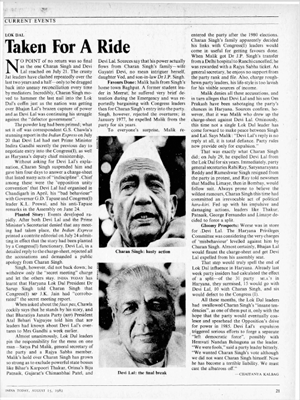TAKEN FOR A RIDE
[India Today]
Published date: 15th Aug 1982
No point of no return was so final as the one Charan Singh and Devi La1 reached on July 21. The crusty Jat leaders have clashed repeatedly over the last two years and a half-only to be dragged back into uneasy reconciliation every time by mediators. Incredibly, Charan Singh moved to hammer the last nail into the Lok Dal’s coffin just as the nation was getting over Bhajan Lal’s brazen capture of power and as Devi Lal’s was continuing his struggle against the “defector government”.
The powder keg had been primed; what set it off was correspondent G.S. Chawla’s stunning report in the Indian Express on July 20 that Devi La1 had met Prime Minister Indira Gandhi secretly the previous day to negotiate entry into the Congress(I), as well as Haryana’s deputy chief ministership.
Without asking for Devi Lal’s explanation, Charan Singh suspended him and gave him four days to answer a charge-sheet that listed many acts of “indiscipline”. Chief among these were the ‘opposition unity convention’ that Devi Lal had organised in Chandigarh in April, his “bad behaviour” with Governer G.D. Tapase and Congress(1) leader K.L. Poswal, and his anti-Tapase remarks in the Assembly on June 24.
Planted Story : Events developed rapidly. After both Devi Lal and the Prime Minister’s Secretariat denied that any meeting had taken place, the Indian Express printed a contrite editorial oh July 24 admitting in effect that the story had been planted by a Congress(I) functionary. Devi Lal in a detailed reply to the charge-sheet, rejected all the accusations and demanded a public apology from Charan Singh.
Singh, however, did not back down; he withdrew only the “secret meeting” charge and let the others stay. INDIA TODAY has learnt that Haryana Lok Dal President Dr Sarup Singh told Charan Singh that Congress(I) MP J.K. Jain had “corroborated” the secret meeting report.
When asked about the faux pas, Chawla cockily says that he stands by his story, and that Bharatiya Janata Party (BJP) President Atal Behari Vajpayee told him that BIP leaders had known about Devi Lal’s overtures to Mrs Gandhi a week earlier.
Almost unanimously, Lok Dal leaders pin the responsibility for the mess on one man-Satya Pal Malik, general secretary of the party and a Rajya Sabha member. Malik’s hold over Charan Singh has grown so strong as to exclude powerful state bosses like Bihar’s Karpoori Thakur, Orissa’s Biju Patnaik, Gujarat’s Chimanbhai Patel, and Devi Lal. Sources say that his power actually flows from Charan Singh’s family-wife Gayatri Devi, no mean intriguer herself, daughter Ved, and son-in-law Dr J.P. Singh.
Favours Done: Malik hails from Singh’s home town Baghpat. A former student leader in Meerut; he suffered Very brief detention during the Emergency and was reportedly bargaining with Congress leaders then for Charan Singh’s entry into the party. Singh, however, rejected the overtures; in January 1977, he expelled Malik from the party for six years.
To everyone’s surprise, Malik re-entered the party after the 1980 elections. Charan Singh’s family apparently decided his links with Congress(1) leaders would come in useful for getting favours done. When Malik got Dr J.P. Singh’s transfer from a Delhi hospital to Ranchi cancelled: he was rewarded with a Rajya Sabha ticket. As general secretary, he enjoys no support from the party rank and file. Also, charge roughhewn party leaders, his life-style is too lavish for his visible sources of income.
Malik denies all these accusations, and in turn alleges that Devi Lal and his son Om Prakash have been sabotaging the party’s chances in Haryana. Sources confirm, however, that it was Malik who drew up the charge-sheet against Detri Lal. Ominously, this time not a single Lok Dal leader has come forward to make peace between Singh and Lal. Says Malik: “ Devi Lal’s reply is no reply at all, it is total defiance. Party rules now provide only for expulsion.”
That was exactly what Charan Singh did; on July 29, he expelled Devi Lal from the Lok Dal for six years. Immediately, party general secretaries Rabi Ray, Satyanarayana Reddy and Rameshwar Singh resigned from the party in protest, and Ray told newsmen that Madhu Limaye, then in Bombay, would follow suit. Always prone to believe the wildest rumours, Charan Singh this time had committed an irrevocable act of political hara-kiri. Fed up with his impulsive and damaging actions, leaders like Thakur, Patnaik, George Fernandes and Limaye decided to force a split.
Gloomy Prospects: Worse was in store for Devi Lal. The Haryana Privileges, Committee was considering the very charges of ‘misbehaviour’ levelled against him by Charan Singh. Almost certainly Bhajan La1 would flaunt the charge-sheet and get Devi Lal expelled from his assembly seat.
That step would truly spell the end of Lok Dal influence in Haryana. Already last week party insiders had calculated the effect of a split-of the 31 party MLA’S in Haryana, they surmised, 15 would go with Devi Lal, 10 with Charan Singh, and six would defect to the Congress (I).
All these months, the Lok Dal leaders had swallowed Charan Singh’s “insane tendencies”, as one of them put it, only with the hope that the party would eventually coalesce and spearhead the Opposition’s drive for power in 1985. Devi Lal’s expulsion triggered serious efforts to forge a separate “left democratic force”, possibly with Hemvati Nandan Bahuguna as the leader. “We were fools,” said a party leader bitterly. “We wanted Charan Singh’s vote although we did not want Charan Singh himself. Now he has become a terrible liability. We must cast the albatross off.”






